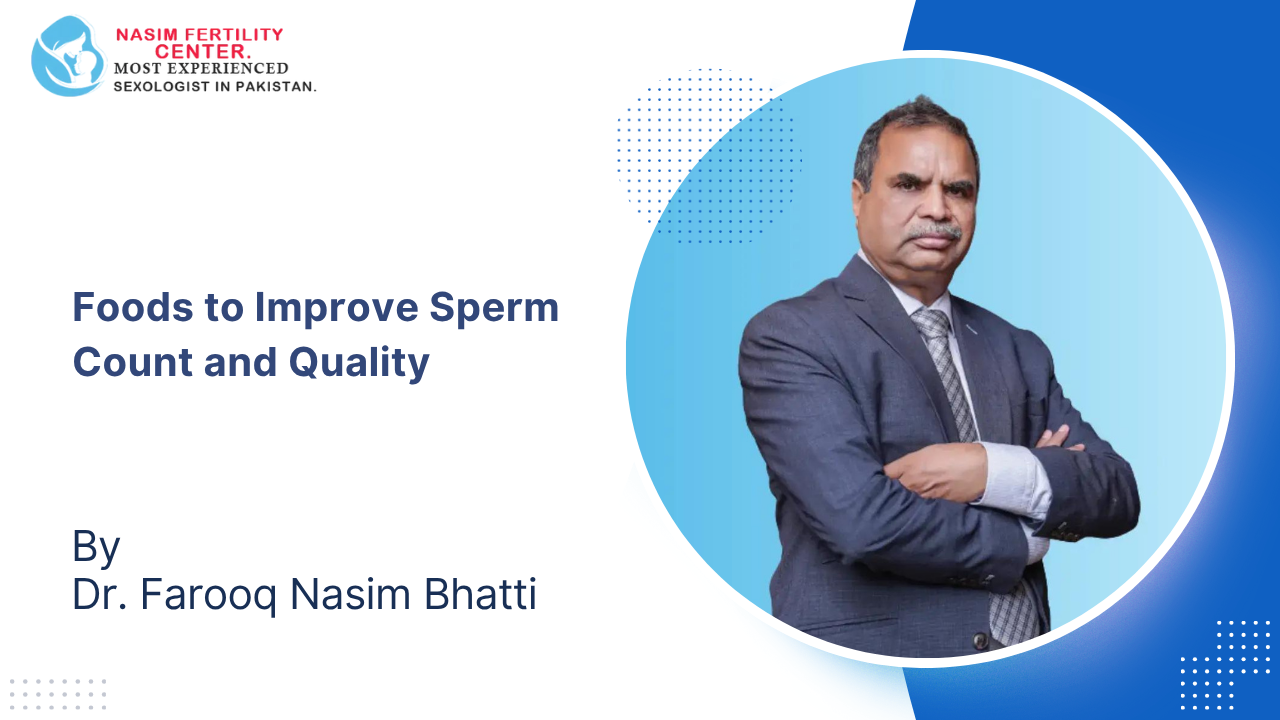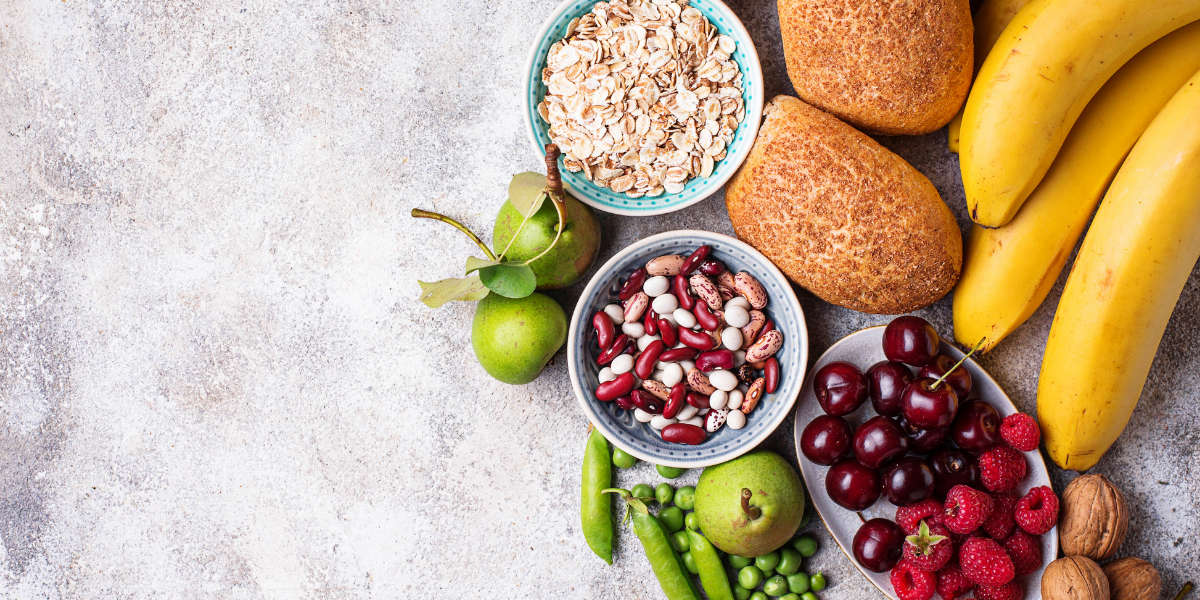
Male fertility plays a vital role in conception, yet many men remain unaware of how strongly diet, lifestyle, and hormonal balance influence sperm health. Issues like low sperm count, weak motility, poor sperm morphology, and reduced semen volume are more common today than ever before. These problems can lead to difficulty conceiving, emotional stress in relationships, frustration, and a decline in confidence.
The encouraging reality is that in many cases, sperm health can be improved. Sperm cells regenerate every 72 to 90 days, which means the choices you make today — food, sleep, stress, habits — directly shape your fertility in the following months. With proper nutrition, lifestyle adjustments, and expert guidance, measurable improvement is not only possible — it is expected.
This article is prepared with professional insight from Dr. Farooq Nasim Bhatti, Pakistan’s first and only MBBS, FAACS (USA), Diplomate American Board of Sexology (USA), male infertility and sexual health specialist. With more than 30 years of clinical experience, he has helped thousands of men restore hormonal balance, sexual function, and healthy sperm production.
Understanding Sperm Health
Before discussing foods, it’s important to understand what determines healthy sperm.
Sperm Count
This refers to the number of sperm present in semen. A normal sperm count is considered to be 15 million or more per milliliter. Anything lower may make conception difficult.
Sperm Quality
Quality is evaluated by examining:
Motility: The ability of sperm to move effectively toward the egg.
Morphology: The size and shape of sperm.
Semen Volume: The amount of fluid carrying sperm.
DNA Integrity: How stable and healthy the genetic material is inside the sperm.
For a successful pregnancy, sperm must be produced in sufficient quantity, be well-formed, and be capable of strong movement.
Common Causes of Low Sperm Count
Low sperm count is more common today due to modern lifestyle factors. High stress, smoking, alcohol use, poor diet, lack of sleep, and exposure to heat (such as using laptops on the lap or long hot baths) can all reduce sperm production. Hormonal imbalance can also play a major role. In many men, excessive pornography use or compulsive masturbation can indirectly weaken sexual response and energy, although it does not permanently damage sperm production by itself. Every case is different, which is why expert evaluation is important.
How Diet Affects Male Fertility
The male reproductive system depends on specific vitamins, minerals, and antioxidants to function properly. Nutrients such as zinc, folic acid, vitamin C, vitamin D, omega-3 fatty acids, and certain amino acids support:
Testosterone production
Healthy sperm formation
Protection of sperm from oxidative damage
Improved movement and shape of sperm cells
A nutrient-rich diet encourages the body to produce stronger, healthier sperm. Let’s explore the best foods that boost sperm count and quality.
Best Foods to Improve Sperm Count and Quality

Walnuts
Walnuts contain healthy fats that strengthen the sperm membrane and improve motility. They are also rich in antioxidants that help protect sperm DNA from oxidative damage. Eating a small handful daily is enough to see benefits.
Eggs
Eggs provide high-quality protein and Vitamin E, which support the structural development of sperm cells. They also encourage healthy testosterone levels.
Bananas
Bananas supply bromelain — a natural enzyme that supports hormone balance. Their Vitamin B6 content helps reduce stress, which is essential because stress hormones directly lower testosterone.
Dark Chocolate
Contains L-arginine, which helps improve blood circulation and enhances semen volume. Even small quantities of dark chocolate (70% cocoa) can support reproductive performance.
Spinach and Leafy Greens
Folic acid, found abundantly in spinach, is essential for healthy sperm shape and genetic integrity. Low folate levels are directly linked to sperm deformities.
Garlic
Garlic increases blood circulation, ensuring that the testes receive sufficient oxygen and nutrients. It also supports immune health, which indirectly boosts fertility.
Fatty Fish
Omega-3-rich fish like salmon, mackerel, and tuna help maintain cell membrane health and improve sperm motility. Omega-3s also support healthy testosterone production.
Citrus Fruits
Citrus fruits provide vitamin C, which prevents sperm clumping and improves motility. Fresh whole fruit is always better than supplements.
Pumpkin Seeds
Pumpkin seeds are one of the richest natural sources of zinc — the mineral most closely linked to testosterone and sperm production.
Pomegranate
Daily pomegranate consumption increases nitric oxide in the body, improving blood flow and sperm concentration while also supporting erection strength.
Additional Fertility-Boosting Foods
Avocados
Rich in healthy fats and Vitamin E, avocados support hormone production and reduce cell inflammation.
Dates
Dates help increase energy, improve stamina, and promote natural hormone balance.
Milk and Yogurt
These foods supply calcium and Vitamin D — both essential for healthy testosterone levels.
Legumes (Beans, Lentils, Chickpeas)
Excellent sources of plant protein and folic acid, which help maintain sperm structure.
Fluids That Support Sperm Health
Water plays a fundamental role in semen volume. Even slight dehydration reduces ejaculate volume and concentration. Drinking enough water daily ensures that sperm are carried effectively through the reproductive tract.
Green tea, when consumed moderately, provides antioxidants that prevent sperm cell damage.
Fresh fruit juices — especially pomegranate, watermelon, and citrus — enhance blood flow and boost vitamin levels, supporting healthier sexual function.
Foods and Habits That Harm Sperm
Some foods and lifestyle habits directly lower sperm count:
Junk food and fried snacks damage sperm DNA.
Soft drinks and sugary items reduce testosterone.
Excessive caffeine creates a hormonal imbalance.
Alcohol and smoking significantly damage sperm DNA and reduce motility.
Tight clothing and prolonged laptop-on-lap use increase testicular heat and reduce sperm production.
Avoiding these habits is as important as eating fertility-boosting foods.
Lifestyle Tips to Naturally Improve Sperm Quality
Healthy fertility is not just about food — it’s about the entire lifestyle.
Regular moderate exercise increases testosterone, but excessive heavy lifting or daily intense training can reduce it. Aim for balanced physical activity such as walking, light gym workouts, cycling, or swimming.
Sleep is essential — testosterone is produced during deep sleep. Aim for 7–8 hours per night.
Stress management plays a critical role. High stress increases cortisol, which directly suppresses testosterone. Mindful breathing, nature walks, reduced screen time, or therapy sessions can help reduce stress.
When Diet Alone Is Not Enough
Sometimes, low sperm count is caused by underlying conditions such as:
Varicocele (vein swelling near the testicles)
Hormonal imbalance
Infections of the reproductive tract
Genetic conditions
Certain medications
Long-term smoking or alcohol use
In these cases, self-treatment may waste valuable time. Professional medical evaluation is crucial.
Male Infertility Treatment with Dr. Farooq Nasim Bhatti
Dr. Farooq Nasim Bhatti is the first and only Diplomate of the American Board of Sexology in Pakistan, internationally certified (USA, Hong Kong, Malaysia, China), and has treated thousands of patients for male infertility, sexual dysfunction, and hormonal imbalance.
His approach includes:
Advanced semen analysis and hormonal diagnostics
Personalized medical and nutritional therapy
Hormone balancing treatments
Treatment for erectile dysfunction and premature ejaculation
Counseling for couples experiencing fertility stress
His treatment programs focus on long-term recovery, not temporary results.
Book Your Consultation
You can consult Dr. Farooq Nasim Bhatti:
Online — from anywhere in Pakistan
Or at his clinics in Lahore, Islamabad & Faisalabad
Confidential, professional, and personalized guidance is just one step away.
Take control of your reproductive health today.
Your journey to restored fertility and confidence begins with the right expert support.
Frequently Asked Questions
1. Can diet alone improve sperm count?
Diet significantly helps, but if the sperm count is very low, professional treatment and evaluation may also be required.
2. How long does it take to see improvement?
Positive changes in sperm health typically appear after 2 to 3 months of dietary and lifestyle adjustments.
3. Do supplements help?
Supplements can support sperm health, but they should be used under a doctor’s guidance to ensure proper dosage and safety.
4. Does masturbation reduce sperm count?
Masturbation does not permanently reduce sperm count, but excessive frequency may temporarily affect energy and sexual performance.
5. Can stress affect fertility?
Yes. High stress raises cortisol levels, which lowers testosterone and affects sperm production.
6. Which tests are recommended to assess sperm health?
A semen analysis is the primary test. Hormonal blood profiles may also be necessary in some cases.
References Supporting Foods to Improve Sperm Count and Quality
World Health Organization. WHO Laboratory Manual for the Examination and Processing of Human Semen. 5th ed. Geneva: WHO; 2010. (Defines normal semen parameters, including sperm concentration ≥15 million/mL.)
Salas-Huetos A, Bulló M, Salas-Salvadó J. Dietary patterns, foods and nutrients in male fertility parameters and fecundability: a systematic review of observational studies. Hum Reprod Update. 2017;23(4):371–389. (Links healthier dietary patterns, antioxidants, folate, omega-3 fats and better semen parameters.)
Yang X-Y et al. Dietary fatty acids as modulators of sperm quality: from basic biology to clinical applications. Int J Mol Sci. 2025;26(…):2797. (Reviews omega-3 fatty acids and sperm motility/morphology, supporting fatty fish and healthy fats.)
Saleem S et al. Nutritional interventions and male reproductive health: antioxidants, micronutrients and dietary patterns. [Review article] 2024. (Summarises evidence for zinc, folate, vitamins C/E and other nutrients in male fertility.)
Boxmeer JC et al. Low folate in seminal plasma is associated with increased sperm DNA damage. Fertil Steril. 2009;92(2):548–556. (Supports the role of folate-rich leafy greens in sperm morphology and DNA integrity.)
Boushaba S, Belaid L. Sperm DNA fragmentation and its relationship with vitamin C and E concentrations in seminal plasma. Basic Clin Androl. 2023. (Connects antioxidant vitamins C and E with protection of sperm DNA from oxidative damage.)
Robbins WA et al. Walnuts improve semen quality in men consuming a Western-style diet: randomized control dietary intervention trial. Biol Reprod. 2012;87(4):101. (Direct RCT evidence that daily walnut intake improves sperm vitality, motility and morphology.)
Wright C, Milne S, Leeson H. Sperm DNA damage caused by oxidative stress: modifiable clinical, lifestyle and nutritional factors in male infertility. Reprod Biomed Online. 2014;28(6):684–703. (Reviews how diet, smoking, obesity and antioxidants affect sperm DNA and overall semen quality.)
Ricci E et al. Semen quality and alcohol intake: a systematic review and meta-analysis. Reprod Biomed Online. 2017. (Shows that daily or heavy alcohol intake is associated with reduced semen volume and abnormal morphology.)
Ilacqua A, Izzo G, Emerenziani GP, Baldari C, Aversa A. Lifestyle and fertility: the influence of stress and quality of life on male fertility. Reprod Biol Endocrinol. 2018;16:115. (Links psychological stress, poor lifestyle, heat exposure and other factors with impaired semen quality.)
Disclaimer
This information is for educational purposes and not the treatment. For treatment, you need to consult the doctor.

Dr. Farooq Nasim Bhatti (MBBS, FAACS – USA, Diplomate: American Board of Sexology, CST, HSC – Hong Kong, CART – Malaysia & China) is a qualified medical sexologist with 30+ years of experience. He has presented 21+ research papers internationally and treats sexual dysfunction through sex therapy, counseling, and pharmacotherapy to restore natural sexual function without temporary medication.

Regain Confidence with Our ED Solutions
Explore effective treatments for erectile dysfunction. Take charge of your intimacy today.


